Day 2 of Chintan Shivir 2024 Highlights Key Discussions on Social Empowerment and Welfare Initiatives
Day 2 of Chintan Shivir 2024 Highlights Key Discussions on Social Empowerment and Welfare Initiatives
The second day of Chintan Shivir 2024 witnessed crucial discussions and presentations by States/UTs on various aspects of social empowerment and welfare, focusing on the challenges faced by marginalized and vulnerable communities. The event was graced by several Delegates/ Senior Officials from States/Union Territories, senior officials from the Ministry, and representatives. Dr. Virendra Kumar, Hon’ble Union Minister of Social Justice and Empowerment, led the day’s proceedings.
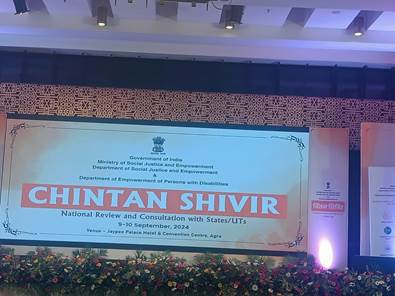
Social Empowerment Session
The morning session began with presentations by select States and Union Territories, including Uttar Pradesh, Kerala, Madhya Pradesh, Punjab, Rajasthan, Sikkim, Tamil Nadu, Telangana. Each state/UT shared insights on their respective social empowerment initiatives, highlighting best practices, innovations, and challenges in implementing schemes aimed at vulnerable groups.
The key areas of focus during the presentations were:
1. Comprehensive Rehabilitation of Persons Engaged in the Act of Begging:
Discussion on strategies and policies to rehabilitate individuals involved in begging, focusing on providing them with healthcare, skill development, and employment opportunities.
2. De-Notified, Nomadic, and Semi-Nomadic Communities:
Presentations discussed on the socio-economic issues faced by the marginalized communities and outlined plans to enhance their access to education, healthcare, and sustainable livelihoods.
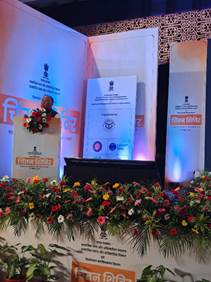
3. Comprehensive Rehabilitation for Welfare of Transgender Persons:
Approaches to empower transgender individuals through education, employment opportunities, and social inclusion measures were discussed. The focus was on ensuring dignity, legal protection, and support for transgender communities across India.
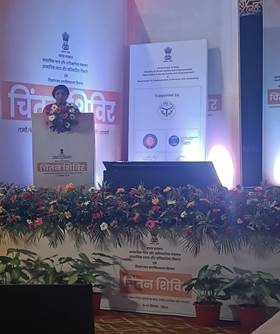
Later, technical sessions were held where key policy and operational challenges were addressed. Presentations included:
1. Issues Related to (SNA):
Discussion on the ongoing challenges and bottlenecks in implementing the SNA model for more efficient and transparent fund allocation across social schemes.
2. Presentation by National Institute of Social Defence (NISD) on Capacity Building Activities:
NISD provided an overview of their capacity-building programs aimed at training and equipping social workers, government officials, and community leaders to deliver better services for vulnerable populations.
3. Presentation by National Informatics Centre (NIC) on Website and Portal Management:
NIC presented on the role of technology in social welfare initiatives, focusing on how improved digital infrastructure and portal management can lead to greater transparency, data accuracy, and accessibility for citizens availing social services.
4. Presentation on Overview of Social Audit and Evaluation Studies:
A comprehensive overview of the social audit mechanism was presented, emphasizing its importance in ensuring accountability and effective implementation of welfare schemes.
5. Presentations on National Finance and Development Corporations
The next session saw detailed presentations on the functioning and impact of various National Finance and Development Corporations:
– National Scheduled Caste Finance and Development Corporation (NSFDC)
– National Backward Classes Finance and Development Corporation (NBCFDC)
– National Divyangjan Finance and Development Corporation (NDFDC)
– National Safai Karamcharis Finance and Development Corporation (NSKFDC)
The presentations highlighted how the corporations work towards economic upliftment by providing financial assistance, skill training, and livelihood support to their respective target groups. Discussions also revolved around improving outreach and operational efficiency of these corporations.
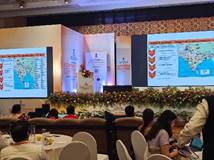
The technical presentations were followed by an interactive Q&A session where officials from the Ministry of Social Justice and Empowerment engaged with State Government representatives. The session allowed for an exchange of ideas on overcoming obstacles, streamlining processes, and aligning state and central initiatives for better service delivery.
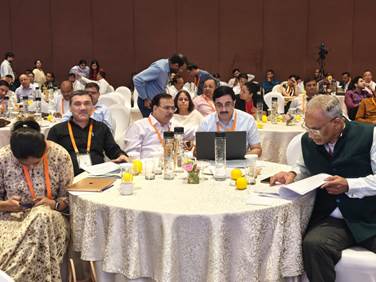
The concluding session of the day was the Valedictory Session, which included:
-Addresses by Hon’ble Ministers from Participating States/UTs:
Several Hon’ble Ministers from the States/UTs provided their closing remarks, reflecting on the fruitful discussions and outlining the way forward in enhancing social empowerment schemes.
– Concluding Remarks by Dr. Virendra Kumar, Hon’ble Union Minister of Social Justice and Empowerment:
Dr. Virendra Kumar expressed gratitude to all the participants and emphasized the need for collective action to bring about sustainable social change. He highlighted the significance of the interactive discussions made and reiterated the Ministry’s commitment to improving the lives of marginalized communities through innovative policies and targeted welfare schemes.
– Vote of Thanks:
The day concluded with a Vote of Thanks extended to all dignitaries, state officials, and participants for their active participation and valuable contributions to the discussions.
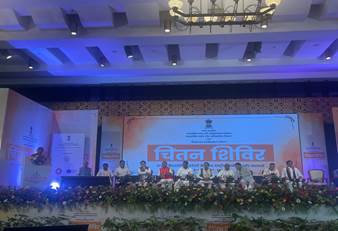
Day 2 of Chintan Shivir 2024 marked a critical step forward in addressing the social welfare challenges faced by India’s vulnerable communities. With actionable insights shared by states, the conference paved the way for strengthening the implementation of welfare schemes, ensuring inclusivity, and improving the lives of marginalized sections of society.